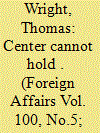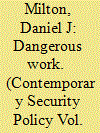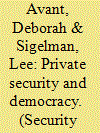| Srl | Item |
| 1 |
ID:
182252


|
|
|
|
|
| Summary/Abstract |
Before the COVID-19 pandemic began, Washington was coalescing
around a new bipartisan consensus: great-power competition,
especially with China, ought to be the main organizing principle
of U.S. foreign policy. For some, the pandemic called that notion into
question by suggesting that transnational threats pose an even greater
danger to the American public than ascendant rival powers. Skeptics of
great-power competition, such as Senator Bernie Sanders, an independent from Vermont, argued that the United States should seek to deescalate tensions with China so that the two countries can work together
to manage borderless risks such as pandemics and climate change.
|
|
|
|
|
|
|
|
|
|
|
|
|
|
|
|
| 2 |
ID:
156085


|
|
|
|
|
| Summary/Abstract |
The goal of diplomats is to represent their countries’ interests through diplomacy, not arms. Because they are not military personnel, they may be perceived as at lower risk of being the target of terrorists. However, recent events have called this perception into question. Despite this danger, there has been little research on terrorist attacks against diplomats. Drawing on the terrorism studies literature, this article argues that diplomats are targeted more than non-diplomatic targets in countries where certain U.S. foreign policies are implemented. An empirical analysis of 471 attacks against U.S. diplomats from 1970 to 2011 reveals that while U.S. alliances and foreign aid increase the likelihood of attacks against diplomats, U.S. military intervention and civil war, on the other hand, increase the risk of terrorism against non-diplomatic targets. This finding is relevant because it shows terrorist attacks against diplomats result from certain types of foreign policy.
|
|
|
|
|
|
|
|
|
|
|
|
|
|
|
|
| 3 |
ID:
112744


|
|
|
|
|
| Publication |
2012.
|
| Summary/Abstract |
This article surveys some of the challenges that President Obama or his successor
will face over the next several years as the United States attempts to "pivot
toward Asia." In view of the ongoing shift in power from West to East, Washington
can no longer assume that it can preserve or transform Asia-Pacific security by its
unilateral actions. Rather, the United States must develop a "lead from behind"
strategy that will assist America's Asia-Pacific friends and allies to "make room
for China" while at the same time encouraging them to take greater responsibility
for regional security. As it develops its plans for the Asia-Pacific region, the
United States will have to accord special attention to three legacy issues (the
China-Taiwan relationship, the unresolved confrontation between North and
South Korea, and the incompatibility of American and Chinese values) which
have confounded U.S.-China relations for six decades. If managed properly, a
U.S. pivot toward Asia can be beneficial to both the United States and America's
regional friends and allies. But this will require Washington to pursue what President
Obama recently described as a "more centered course" that leverages America's
assets in the Asia-Pacific while avoiding policies that force regional governments
to choose between Washington and Beijing.
|
|
|
|
|
|
|
|
|
|
|
|
|
|
|
|
| 4 |
ID:
152843


|
|
|
| 5 |
ID:
097370


|
|
|
|
|
| Publication |
2010.
|
| Summary/Abstract |
Arguments about the importance of democracy for international behavior assume that states rely on military organizations rather than "hired guns." With the growth of the private security market this assumption no longer holds true. Focusing on the United States, we use original data to compare the impacts of using private military/security forces and military forces on attributes identified as endemic to democracies: constitutionalism, transparency, and public consent. Our evidence indicates that forces raised via contract are harder to learn about and thus less transparent than military forces. Largely due to lowered transparency, Congress has a harder time exercising its constitutional role, which impedes constitutionalism. Finally, though the public is just as sensitive to the deaths of private forces as it is to military deaths, it is less likely to know about them. Thus the lack of transparency also circumvents meaningful public consent. We conclude with a consideration of the potential implications of these changes for U.S. foreign policy.
|
|
|
|
|
|
|
|
|
|
|
|
|
|
|
|